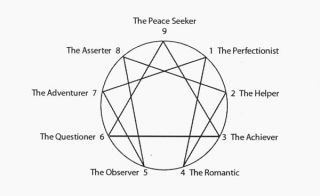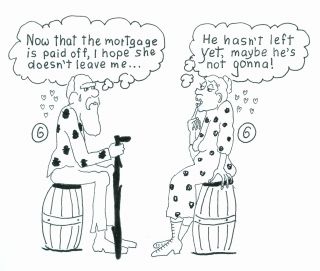
Personality
Criticism of the DSM-5 and a Suggestion, II
The Enneagram would allow therapists to compare healthy vs unhealthy behaviors.
Posted May 21, 2013
“My reaction is appropriate—I don’t need a psychologist.”

“My reaction is appropriate—I don’t need a psychologist.”
Dr. Insel and others believe a new paradigm for understanding mental disorders is needed. I suggest the American Psychological Association use the Enneagram system of personalities, as I have mentioned before in this blog. This system is not abstract. It’s based on real people. The Enneagram describes 9 basic styles of behaviors in levels from healthy to unhealthy. Biology may be more responsible for creating the 9 styles than environment, though the two are entwined. Therapists would relate their clients to a standard of healthy personalities, with disorders at the opposite end of the continuum. Don Riso’s health levels (see Personality Types, 1987, and Understanding the Enneagram, 1990) could be updated by scientists. Some diseases, such as schizophrenia, depression, and psychosis, could be described either as outside the 9 personalities or as cutting across several of them.
Benedict Carey, in his article about the DSM-5 in New York Times Science 11-27-12, Thinking Clearly about Personality Disorders, wrote, “The problem is the most central, memorable, and knowable element of any person—personality—still defies any consensus.” I believe the Enneagram, however, is a well of known information about personalities and what motivates people.

The Enneagram figure
Let me show you how it could work, according to my interpretations of the pathologies:
• Enneagram type 1 when healthy is well organized, idealistic, and wants to do things right. When this personality is carried to an extreme and becomes pathological, it is obsessive-compulsive.
• Enneagram type 2 when healthy helps, gives, and is in tune with others’ feelings. When this personality is carried to an extreme, it becomes manipulative and histrionic.
• Enneagram type 3 when healthy works hard, achieves a lot, and thinks well of his or her abilities. Carried to an extreme, this personality becomes narcissistic and grandiose.
• Enneagram type 4 when healthy is compassionate and introspective, but carried to an extreme becomes depressed.
• Enneagram type 5 when healthy is independent, observant, likes to know. When pathological, this personality is avoidant.
• Enneagram type 6 when healthy is alert, watchful, and concerned with safety. Carried to an extreme it becomes paranoid and anxious.

From Are You My Type, Am I Yours? by Elizabeth Wagele
• Enneagram type 7 when healthy is fun-loving, optimistic, and enthusiastic. Carried to an extreme it becomes manic.
• Enneagram type 8 personality is assertive, courageous and often a leader. Carried to an extreme it becomes violent.
• Enneagram type 9 personality seeks peace and harmony. Carried to an extreme it becomes too passive or dissociative.
While the DSM-5 unfortunately turns some normal reactions into pathological ones, therapists are likely to put deviations from normal in perspective by comparing them to healthy standards. The Enneagram, with its range of healthy to unhealthy behaviors, is an excellent tool for this, and an accurate resource for understanding the complexities of personalities.
Saturday, May 25, 2013 at 7:30 Elizabeth will give a book talk on THE ENNEAGRAM OF DEATH in Mountain View CA. http://www.eastwest.com 650-988-9800

